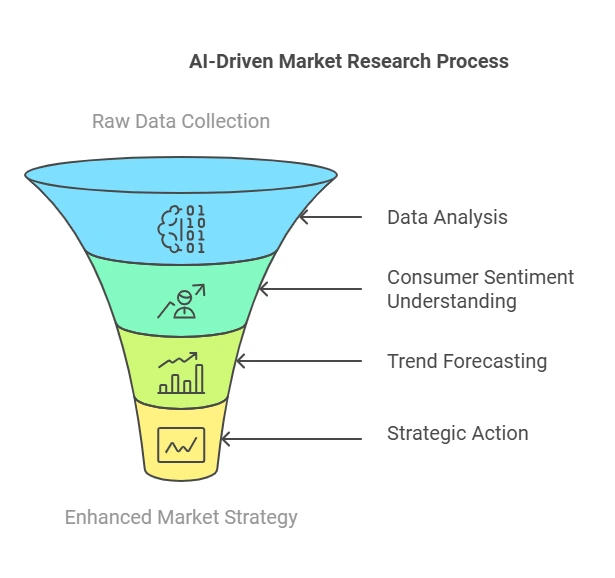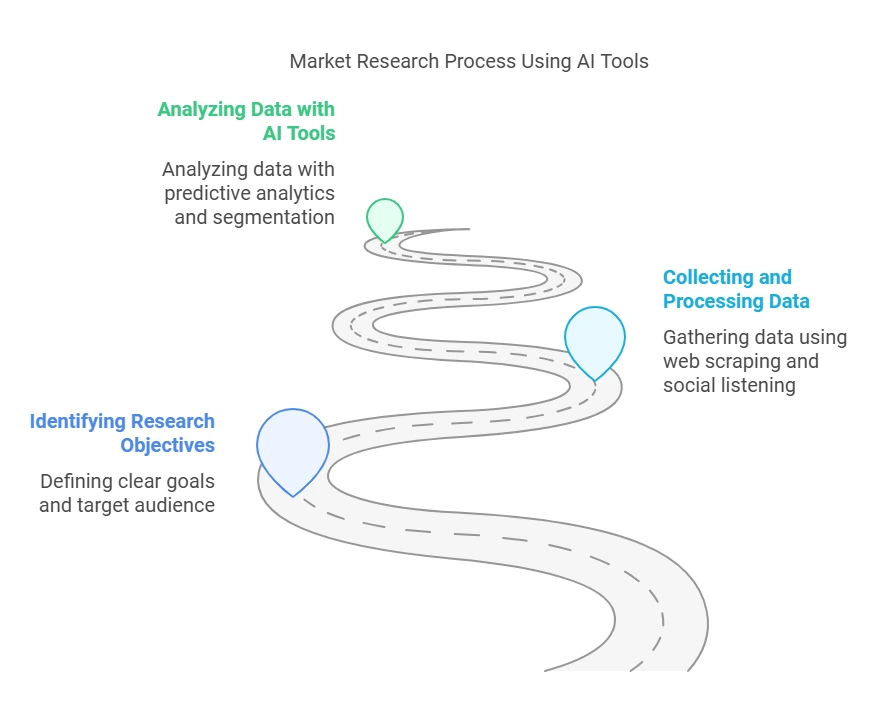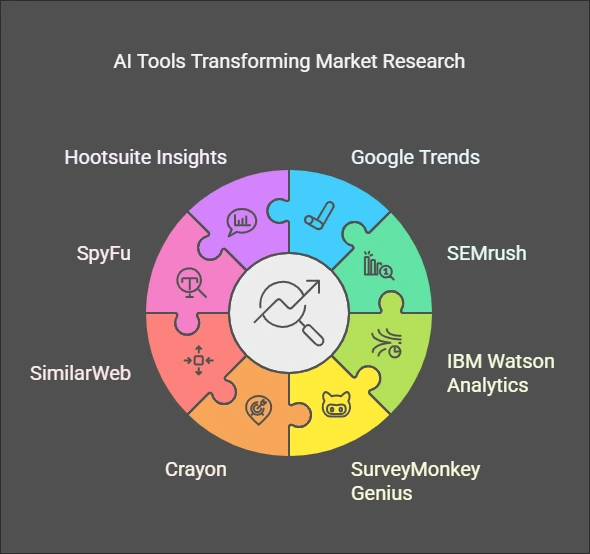Table of Contents
Love this post? Share it!
Introduction
In the fast-paced world of business, staying ahead of the curve often means embracing innovative tools that simplify complex processes. Artificial Intelligence (AI) has emerged as a game-changer, revolutionizing how businesses conduct market research and generate leads. Whether you’re a seasoned entrepreneur or just starting, leveraging AI can transform your strategy, saving time, money, and effort while delivering precise and actionable insights. Let’s dive into how AI can supercharge your market research and lead generation efforts.
What is AI-Powered Market Research and Lead Generation?
AI-powered market research involves using advanced algorithms and machine learning to gather, analyze, and interpret vast amounts of data about market trends, consumer behavior, and industry insights. On the other hand, AI-driven lead generation focuses on identifying potential customers, analyzing their preferences, and personalizing outreach efforts to boost conversions. These tools work hand-in-hand, providing businesses with a data-driven foundation to make smarter decisions.
By automating traditionally manual tasks like data collection and segmentation, AI doesn’t just make things easier—it makes them smarter, uncovering patterns and opportunities humans might overlook.
Why AI is Transforming Market Research and Lead Generation
AI is transforming the game because it provides unparalleled efficiency, precision, and scalability. Unlike manual methods, which can be time-consuming and prone to error, AI tools process massive datasets in real time. They offer valuable insights with pinpoint accuracy, helping businesses understand their audience and refine their strategies.
Moreover, AI brings predictive capabilities to the table. Imagine knowing which products your customers will want next month or identifying high-potential leads before your competitors do. These predictive analytics give businesses a significant competitive edge, allowing them to stay one step ahead in a dynamic marketplace.
Who Can Benefit from AI Tools in Business?
The beauty of AI lies in its versatility. Startups can use AI to enter markets with a clear understanding of their audience, while established companies can streamline operations and expand their reach. Marketers use AI for targeted campaigns, sales teams leverage it for lead qualification, and product managers harness it to predict demand trends.
Small business owners, freelancers, and even solopreneurs can benefit from AI by using affordable, user-friendly tools to level the playing field against larger competitors. No matter your niche or industry, if data drives your decisions, AI tools are a must-have.
Want to leverage AI to build a profitable online business but don’t know where to start? 🚀 Our beginner-friendly guide walks you through everything you need to know to launch and scale with AI. Don’t miss out—grab your copy of “How to Build an AI-Powered Online Business: A Beginner’s Guide” today! 👉 Get your eBook now!
Understanding AI in Market Research

The Basics of AI in Market Research
AI in market research is about more than just crunching numbers; it’s about drawing actionable insights from data. At its core, AI combines machine learning, natural language processing (NLP), and predictive analytics to interpret data patterns, understand consumer sentiment, and forecast trends. This technology automates repetitive tasks, like analyzing surveys or tracking competitor activity, allowing businesses to focus on strategic actions.
Definition and Role of AI
Artificial Intelligence refers to computer systems designed to mimic human intelligence, including problem-solving, learning, and decision-making. In market research, AI acts as a powerful assistant, analyzing data from diverse sources—social media, customer reviews, sales records, and more—to provide a comprehensive view of the market landscape.
From identifying untapped opportunities to assessing competitor strategies, AI doesn’t just crunch data—it interprets it in ways that drive actionable results.
Key Technologies Behind AI Tools
Several key technologies make AI tools incredibly effective:
- Machine Learning (ML): Enables systems to improve over time by learning from data, identifying patterns, and making predictions.
- Natural Language Processing (NLP): Helps AI understand and analyze human language, crucial for sentiment analysis and customer feedback interpretation.
- Predictive Analytics: Uses historical data to forecast future trends, allowing businesses to make proactive decisions.
- Computer Vision: Often used for visual data analysis, like analyzing product images or video content.
These technologies work together to provide a holistic approach to market research.
Advantages of Using AI for Market Research
Speed and Efficiency
Traditional market research methods can take weeks or months to deliver results. AI, however, processes data in real time, giving businesses the ability to act quickly. Need to know how your product launch is trending on social media? AI tools can analyze thousands of mentions and provide insights in minutes.
Scalability and Cost-Effectiveness
With AI, businesses can scale their research efforts without significant additional investment. Whether analyzing one city or an entire continent, AI tools handle large-scale operations seamlessly, making them ideal for businesses of all sizes.
Accuracy and Insights
Human error is a risk in manual data analysis, but AI tools are designed for precision. They not only minimize mistakes but also identify nuanced insights, such as subtle shifts in consumer preferences or emerging market trends, that might go unnoticed with traditional methods.
By offering accuracy and depth, AI ensures businesses make informed, data-backed decisions that drive growth.
AI has redefined how businesses approach market research and lead generation, combining speed, efficiency, and intelligence to deliver outstanding results. In the sections ahead, we’ll explore how to implement these tools effectively and unlock their full potential.
Steps to Conduct Market Research with AI Tools

AI tools can turn the daunting task of market research into an organized, efficient, and insightful process. By following these steps, you can leverage AI to uncover actionable insights and make informed decisions.
Step 1: Identifying Research Objectives
The first step in any successful market research project is defining clear objectives. AI tools work best when guided by a specific purpose, so it’s essential to start with a roadmap.
Pinpointing Business Goals
What do you hope to achieve with your research? Whether it’s understanding market demand, evaluating competitors, or gauging customer preferences, outlining your goals helps focus your efforts. Clear objectives also ensure the data collected aligns with your strategic priorities, saving time and resources.
If you’re looking to start and grow your online business successfully, don’t miss out on our expert guide! 🚀 Get your copy of “From Zero to Hero: A Step-by-Step Guide to Making Money Online” today and start building your financial freedom. 👉 Grab your eBook now!
Narrowing Down Target Audience
AI tools excel when provided with a well-defined audience. Instead of casting a wide net, hone in on the demographics, behaviors, and preferences of your ideal customers. By narrowing your focus, AI can analyze data that’s most relevant to your business, providing insights into what truly matters to your audience.
Step 2: Collecting and Processing Data
Once you’ve defined your objectives and audience, it’s time to gather the data. AI tools offer powerful capabilities to automate this process, pulling information from various sources to create a comprehensive dataset.
Using Web Scraping Tools for Market Trends
Web scraping tools powered by AI can collect vast amounts of information from websites, forums, and online publications. Want to know what’s trending in your industry or how competitors are positioning their products? These tools can provide a snapshot of the market landscape, giving you valuable insights to act on.
Social Media Listening for Consumer Sentiments
Social media platforms are treasure troves of consumer opinions. AI tools specializing in social listening analyze mentions, hashtags, and comments to uncover how people feel about your brand or industry. This real-time feedback is invaluable for understanding public sentiment and spotting emerging trends. Try this great AI tool ocoya : Push a button, post on all socials. Social media – using AI. It’s like having ChatGPT, Canva and Hootsuite at your fingertips.
Step 3: Analyzing Data with AI Tools
Data collection is only half the battle; the real magic happens during the analysis phase. AI tools help businesses turn raw data into actionable insights by identifying patterns and predicting future trends.
Predictive Analytics for Market Trends
Predictive analytics uses historical data to forecast what’s likely to happen next. For instance, AI might identify that interest in a specific product category spikes during certain seasons, helping you plan marketing campaigns or inventory accordingly. This forward-looking approach empowers businesses to stay ahead of the curve.
Customer Segmentation through AI Algorithms
AI algorithms excel at sorting customers into distinct segments based on behavior, preferences, and demographics. By understanding these segments, you can tailor your marketing efforts to meet specific needs, increasing the likelihood of conversions. Whether it’s crafting personalized email campaigns or adjusting your pricing strategy, customer segmentation ensures your outreach resonates.
Following these steps allows businesses to harness the full power of AI tools for market research. By combining a clear focus, robust data collection, and advanced analysis, you can make smarter decisions that drive success in a competitive marketplace.
AI Tools for Market Research

AI tools have revolutionized market research, making it more accessible, efficient, and insightful than ever. With countless options available, it’s essential to understand their features, capabilities, and how they align with your business needs. Let’s explore popular tools, their applications, and how to choose the right one for your goals.
Popular Tools and Their Features
Several AI-powered tools dominate the market, each offering unique features tailored to specific research needs:
- Google Trends: Tracks search trends to identify rising topics and consumer interests.
- SEMrush: Provides keyword research, competitor analysis, and content suggestions, ideal for SEO-driven insights.
- IBM Watson Analytics: Offers advanced data visualization, predictive analytics, and natural language understanding for complex datasets.
- SurveyMonkey Genius: Uses AI to analyze survey responses, highlighting key trends and insights.
Each of these tools provides a robust platform for collecting and analyzing data, empowering businesses to make informed decisions quickly.
Tools for Competitive Analysis
Staying ahead of competitors requires deep insights into their strategies. AI tools for competitive analysis help businesses monitor competitors’ activities, pricing strategies, and market positioning.
- Crayon: Tracks competitors’ websites, social media, and marketing materials to uncover trends and strategic shifts.
- SimilarWeb: Analyzes web traffic, audience demographics, and referral sources, providing a detailed view of competitors’ digital performance.
- SpyFu: Focuses on competitor keyword usage, revealing how they rank in search engines and where opportunities lie.
These tools equip businesses with the information needed to refine their strategies and maintain a competitive edge.
Sentiment Analysis Platforms
Understanding public sentiment is crucial for gauging consumer opinions about your brand or industry. Sentiment analysis platforms analyze text data from reviews, social media posts, and forums to determine public attitudes.
- Hootsuite Insights: Powered by Brandwatch, this tool monitors social media and provides real-time sentiment analysis.
- Lexalytics: Processes customer feedback and reviews, offering detailed insights into emotions and opinions.
- MonkeyLearn: Customizable sentiment analysis for analyzing survey responses, customer feedback, and more.
These platforms are invaluable for reputation management, identifying pain points, and refining marketing strategies based on customer feedback.
How to Choose the Right Tool
Matching Tool Capabilities with Business Needs
Start by defining what you want to achieve. Are you looking for competitor insights, consumer sentiment, or predictive analytics? Ensure the tool you choose specializes in the area most relevant to your objectives. A comprehensive tool might offer multiple features, but focusing on your priority areas will maximize its value.
Pricing and Scalability Considerations
AI tools come with varying price points, from free versions with limited features to premium solutions offering extensive capabilities. Consider your budget and the tool’s scalability. If your business is growing, choose a platform that can adapt to increasing data needs or provide advanced features as you expand.
By selecting the right AI tools and leveraging their features effectively, businesses can transform their market research processes, gaining a deeper understanding of their market and customers. With the proper setup, these tools provide a competitive advantage that’s hard to beat.
Leveraging AI for Lead Generation
AI has transformed lead generation, making it faster, smarter, and more targeted. By automating processes and providing deep insights, AI empowers businesses to identify, engage, and convert potential customers more efficiently. Here’s how AI is shaping the future of lead generation and practical steps to harness its power.
The Basics of AI in Lead Generation
AI simplifies lead generation by automating repetitive tasks, analyzing vast datasets, and delivering personalized engagement. From identifying high-potential leads to nurturing them through the sales funnel, AI tools streamline every step of the process.
What is AI-Powered Lead Scoring?
AI-powered lead scoring evaluates and prioritizes leads based on their likelihood to convert. Using algorithms, these tools analyze behavioral data, engagement patterns, and demographic information to assign a score to each lead. This allows sales teams to focus their efforts on the most promising prospects, boosting efficiency and conversion rates.
Automating the Lead Qualification Process
AI automates lead qualification by analyzing incoming data and filtering out unqualified leads. Tools can assess a prospect’s fit based on predefined criteria like budget, industry, or purchasing intent. This not only saves time but ensures that sales teams are only engaging with high-value opportunities.
Steps for Effective Lead Generation Using AI
Using AI Chatbots for Engagement
AI chatbots are excellent for initiating conversations and capturing leads. They can answer queries, collect contact information, and even schedule appointments—all in real-time. Chatbots like Drift and Intercom are highly effective at maintaining engagement while reducing response times.
Personalizing Lead Outreach with AI
AI tools analyze customer data to craft personalized messages tailored to individual preferences and behaviors. This can include personalized email campaigns, dynamic website content, or targeted social media ads. Personalization increases the likelihood of engagement and strengthens the connection with potential customers.
AI Tools for Lead Generation
Best Tools for Lead Generation
- HubSpot: Offers AI-powered tools for lead tracking, scoring, and nurturing.
- ZoomInfo: Provides detailed company and contact data for targeted outreach.
- Salesforce Einstein: Enhances CRM with AI features like predictive lead scoring and automation.
Email Campaign Optimization Tools
Email remains a cornerstone of lead generation. AI tools like Mailchimp and ActiveCampaign optimize email campaigns by analyzing open rates, click-through rates, and engagement patterns. These platforms offer recommendations to improve subject lines, sending times, and content for maximum impact.
Looking for an all-in-one AI tool to send emails, automate marketing, and monetize your content effortlessly? 🚀 GetResponse helps you grow your audience and boost revenue with ease! Start automating your success today! 👉 Try GetResponse now!
CRM Integration for Streamlined Follow-Ups
Integrating AI with your CRM system, such as Salesforce or Zoho, ensures seamless follow-ups. AI-powered CRMs automate reminders, prioritize leads, and suggest next steps based on past interactions, keeping the sales process efficient and organized.
Maximizing ROI with AI in Lead Generation
Tracking KPIs and Adjusting Strategies
AI tools provide real-time insights into key performance indicators (KPIs) like conversion rates, cost per lead, and customer acquisition costs. By continuously monitoring these metrics, businesses can adjust their strategies to optimize performance and achieve better ROI.
Balancing Automation and Human Touch
While AI excels at automation, it’s essential to balance it with a human touch. Automated processes can handle routine tasks, but genuine connections require empathy and personalization. For example, while AI can identify the best time to call a lead, a sales representative can close the deal by addressing specific concerns.
By leveraging AI for lead generation, businesses can unlock new levels of efficiency and precision. From scoring leads to automating outreach and optimizing campaigns, AI tools offer a competitive advantage in building stronger, more profitable customer relationships.
Integrating AI Across Business Functions
AI becomes exponentially more valuable when integrated across various business functions. Combining insights, aligning strategies, and fostering collaboration enable businesses to maximize efficiency and ROI. This section explores how AI-powered market research and lead generation can seamlessly work together, along with strategies to overcome common challenges in AI implementation.
Combining Market Research and Lead Generation Efforts
Using Insights to Drive Sales
Market research data gathered through AI tools provides valuable insights into consumer preferences, market trends, and competitive positioning. By integrating this data into lead generation efforts, businesses can tailor outreach strategies to target the right audience with precision. For instance, understanding regional demand can help sales teams focus on high-potential markets.
Aligning Marketing Campaigns with Research Findings
AI allows businesses to align their marketing campaigns with the latest research findings. A campaign informed by data—such as consumer sentiment or trending keywords—has a higher chance of resonating with the audience. AI tools like SEMrush or Google Analytics ensure that marketing efforts are relevant, timely, and effective.
Cross-Functional Collaboration with AI
Enhancing Team Efficiency
AI streamlines workflows across departments by automating routine tasks, enabling teams to focus on strategic initiatives. For example, customer service teams can use AI chatbots to handle FAQs, while sales and marketing teams focus on nurturing leads.
Sharing Insights Across Departments
AI-generated insights shouldn’t remain siloed. Sharing findings across departments fosters collaboration and ensures alignment. For instance, the marketing team can use sales data to refine campaign targeting, while product teams can leverage consumer feedback to improve offerings. Tools like Slack or Microsoft Teams with integrated AI analytics can facilitate this cross-functional sharing.
Overcoming Challenges in AI Implementation
Common Pitfalls in Using AI for Market Research and Lead Generation
- Overreliance on Automation: While AI can handle repetitive tasks, relying solely on automation may result in generic insights or missed opportunities. Businesses must strike a balance between AI capabilities and human intervention.
- Misinterpreting AI-Generated Insights: AI generates data-driven insights, but they require human expertise for context and decision-making. Misinterpreted data can lead to misguided strategies.
Solutions to Common Challenges
- Building a Skilled Team to Work Alongside AI
Equip your team with the skills needed to interpret and utilize AI-generated insights effectively. Training programs, workshops, and certifications can bridge knowledge gaps, ensuring seamless collaboration between humans and AI. - Regularly Updating and Monitoring AI Tools
AI tools require constant updates to remain accurate and effective. Regularly monitoring their performance ensures they adapt to changing trends, regulations, or business needs. Investing in tools with robust customer support can help address issues quickly.
By integrating AI across business functions, companies can create a unified, data-driven approach to decision-making. The key lies in leveraging AI to complement human expertise, fostering collaboration, and continuously refining strategies for sustained growth.
Case Studies and Success Stories
AI-powered market research and lead generation are not just theoretical concepts—they have been successfully implemented across various industries, delivering remarkable results. Let’s explore some real-life examples where businesses are winning with AI, as well as predictions for the future of AI in these fields.
How Businesses Are Winning with AI-Powered Market Research
Many companies have revolutionized their market research processes by leveraging AI tools. For example, Unilever, a global leader in consumer goods, uses AI to analyze customer feedback and sentiment across multiple channels. By utilizing AI-driven insights, the company has been able to quickly identify shifts in consumer preferences, allowing them to adjust their product offerings and marketing campaigns in real-time.
Netflix also uses AI to conduct market research through analyzing vast amounts of viewer data to determine content preferences. This has helped them invest in successful original content, such as Stranger Things, which was based on predictive algorithms. By understanding exactly what their audience craves, companies like Netflix can continually refine their offerings and stay ahead of the curve.
Lead Generation Success Through AI: Real-Life Examples
AI has also been a game-changer in the world of lead generation. One standout example is HubSpot, a leading CRM platform, which uses AI-powered tools for lead scoring, segmentation, and nurturing. Their AI system automatically analyzes visitor behavior on websites and assigns a score to each lead based on how likely they are to convert. This has allowed sales teams to focus on high-quality leads, improving efficiency and conversion rates.
Another success story is L’Oréal, which integrates AI chatbots into its lead generation strategy. By using virtual assistants like ModiFace, L’Oréal engages customers, collects their preferences, and nurtures leads, ultimately converting them into buyers. AI tools have helped L’Oréal personalize its outreach and streamline customer interactions, driving more conversions with less effort.
The Future of AI in Market Research and Lead Generation
Emerging Trends in AI Technology
As AI continues to evolve, several key trends are emerging that will further transform market research and lead generation:
- AI-Driven Personalization: Future AI tools will take personalization to the next level, offering hyper-targeted content and offers based on real-time data analysis.
- Voice Search and AI Integration: With the rise of voice-activated assistants, AI tools will increasingly use voice data to gain deeper insights into consumer preferences and intent.
- Predictive Lead Generation: AI will move beyond lead scoring to predictive lead generation, anticipating future customer behavior and offering proactive outreach.
Predictions for the Next Decade
In the next decade, AI is expected to further integrate into daily business operations. It will become an indispensable tool for small and large businesses alike, enabling even greater automation, real-time decision-making, and personalized marketing strategies. Predictive analytics will become even more accurate, allowing businesses to forecast trends and adjust strategies before changes happen. By 2030, businesses that don’t incorporate AI-driven strategies will likely fall behind competitors who are leveraging its full potential.
Conclusion
AI has the power to revolutionize market research and lead generation, providing businesses with valuable insights, enhancing efficiency, and improving overall growth strategies. By incorporating AI tools into your processes, you can gain a competitive edge, drive better sales results, and make more informed business decisions.
Recap of Key Benefits and Strategies
- AI enhances efficiency, automating tasks like data collection, analysis, and lead qualification.
- AI provides deep insights into consumer behavior, helping businesses target the right audience.
- Personalized outreach powered by AI increases engagement and conversion rates.
Encouragement to Start Using AI for Growth
The potential for growth through AI is enormous. Don’t wait—start integrating AI tools into your market research and lead generation strategies today. Whether you’re a small business or a large enterprise, AI offers scalable solutions that can help you reach your business goals faster.
FAQs
- What are the best AI tools for market research and lead generation?
Some of the top AI tools include HubSpot, SEMrush, Google Analytics, and Salesforce Einstein for lead generation, and IBM Watson Analytics, SimilarWeb, and Crayon for market research. - How much does it cost to implement AI tools in these processes?
The cost of AI tools can vary greatly depending on the features and scale of the platform. Small businesses may find affordable options starting at $20-$50 per month, while larger organizations might invest in enterprise solutions costing thousands per month. - Can small businesses effectively use AI for market research?
Yes, AI tools are increasingly becoming accessible for small businesses, with affordable and user-friendly options that provide significant insights without requiring a large budget. - Are there ethical concerns with AI in market research and lead generation?
Yes, ethical concerns such as data privacy, consent, and bias in AI algorithms should be considered. It’s important for businesses to ensure they follow data protection regulations like GDPR and maintain transparency in how they use AI. - How do I measure the success of AI in my business?
The success of AI can be measured by tracking key performance indicators (KPIs) such as conversion rates, lead qualification accuracy, sales growth, and customer satisfaction. Regularly reviewing these metrics will help you understand the impact of AI on your business outcomes.

